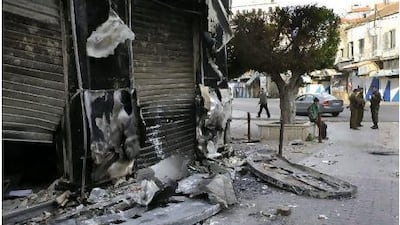ISTANBUL // Turkey called on the government of neighbouring Syria yesterday to enact democratic reforms as soon as possible.
"We hope there will not be any developments that upset us even more deeply and increase our concerns, like the ones in Libya," Recep Tayyip Erdogan, the Turkish prime minister, said yesterday about the situation in Syria.
Referring to promises of reform by the government in Damascus, Mr Erdogan added during a televised news conference before departing on a two-day visit to Iraq that those reforms should "be put into practice immediately".
But Ankara is not saying that the president, Bashar al Assad, should step aside.
Mr Erdogan said that he had demanded political reforms from Mr Assad. "We told him: 'If you give a positive answer to the people's demands, you will ensure that Syria overcomes its problems more easily.'" Mr Assad had told him the Syrians were working on a law regulating the activities of political parties. Asked by a reporter whether Mr Assad had given his word he would undertake reforms, Mr Erdogan said: "We did not receive a 'No' for an answer."
The unrest in Syria has carried the wave of popular revolts sweeping the Middle East to Turkey's doorstep for the first time. When the old regimes of Tunisia and Egypt were shaken by uprisings earlier this year, officials from Turkey, a western-style republic with a Muslim population that has been touted as a model for the region, was very clear in saying that rulers there should listen to the demands of the people and step aside. But with Syria, it is a different matter.
Mr Erdogan said he had spoken to Mr Assad twice over the past three days. In the meantime, Ahmet Davutoglu, Turkey's foreign minister, talked with Walid al Moallem, his Syrian counterpart. The head of Turkey's intelligence service visited Damascus on Sunday, Mr Erdogan said.
"We have expressed the recommendation that [political reforms] be in deed and not on paper only and that it was necessary that he, himself, address the public on that issue," Mr Erdogan said about Mr Assad. "We hope that he delivers that statement today or tomorrow."
While Turkey is in close contact with the government in Damascus, there have not been talks between Ankara and opposition figures in Syria, a Turkish official said. Speaking on condition of anonymity because of the sensitivity of the issue, the official added: "It is not our policy to get involved."
In Libya, Turkey does get involved. Ankara's representatives have held talks with the government in Tripoli as well as with opposition leaders in Benghazi.
According to the official, Ankara had been trying to broker a deal aimed at a peaceful transfer of power in Libya before the western bombing campaign started there on March 19. At the London conference on Libya today, Ankara will push for more efforts to reach a political solution, the official said. Mr Erdogan said yesterday Turkey had reached an agreement with the Libyan opposition to take over the running of Benghazi airport to facilitate the distribution of humanitarian aid.
"You should not fear democracy," was the message that the Turkish government was sending to regimes in the Middle East, according to the Turkish official. "They have to go with the tide," he said about autocratic governments in the region. "Otherwise they will be swept away."
One reason Ankara is not putting too much pressure on Syria is the fact that Turkey is happy with the way ties with Damascus have flourished.
Mr Erdogan has developed a strong personal relationship with Mr Assad, deepened by many bilateral meetings in recent years. In 2009, the two countries abolished visa requirements for their citizens. Economic relations have also improved considerably.
Syria is described as a "friend and brother" in official Turkish statements. Representatives from Ankara and Damascus meet regularly in a "high-level strategic cooperation council" that is designed to strengthen cooperation further. Turkey and Syria share a border of almost 900 kilometres, and there are many family ties between people of the two countries.
The improvement in ties marks a dramatic turnaround from tensions in the 1990s, when Turkey and Syria came close to war over Syria's willingness to offer a safe haven for Kurdish rebels.
In 1998, Turkey sent tanks to the border with Syria and forced Damascus to expel members of the Kurdistan Workers' Party, or PKK, a rebel group fighting for Kurdish self-rule in Turkey. Abdullah Ocalan, the PKK leader, had to leave his residence in Syria and was arrested by Turkish agents in Kenya in 1999. He has been in prison in Turkey ever since.
Given the positive development of Turkish-Syrian relations, Ankara is trying to stick to its general message of democratic change without undermining its ties with the Assad government.
"We want to preserve the good relationship, especially after such a long time of not having it," the Turkish official said. "We do not want any instability."
Syrian officials had indicated they were aware of the necessity of political change, the Turkish official said. "It seems they are convinced of the need to reform," he said. Referring to the uprisings in the region, the official noted dryly that "by now, every leader in the Middle East is convinced of reform".

